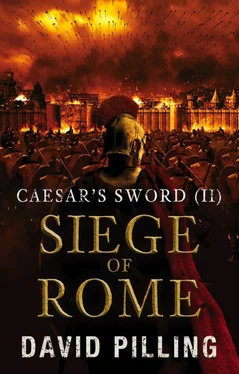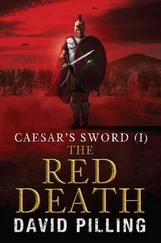David Pilling - Siege of Rome
Здесь есть возможность читать онлайн «David Pilling - Siege of Rome» весь текст электронной книги совершенно бесплатно (целиком полную версию без сокращений). В некоторых случаях можно слушать аудио, скачать через торрент в формате fb2 и присутствует краткое содержание. Год выпуска: 2013, Жанр: Исторические приключения, на английском языке. Описание произведения, (предисловие) а так же отзывы посетителей доступны на портале библиотеки ЛибКат.
- Название:Siege of Rome
- Автор:
- Жанр:
- Год:2013
- ISBN:нет данных
- Рейтинг книги:3 / 5. Голосов: 1
-
Избранное:Добавить в избранное
- Отзывы:
-
Ваша оценка:
- 60
- 1
- 2
- 3
- 4
- 5
Siege of Rome: краткое содержание, описание и аннотация
Предлагаем к чтению аннотацию, описание, краткое содержание или предисловие (зависит от того, что написал сам автор книги «Siege of Rome»). Если вы не нашли необходимую информацию о книге — напишите в комментариях, мы постараемся отыскать её.
Siege of Rome — читать онлайн бесплатно полную книгу (весь текст) целиком
Ниже представлен текст книги, разбитый по страницам. Система сохранения места последней прочитанной страницы, позволяет с удобством читать онлайн бесплатно книгу «Siege of Rome», без необходимости каждый раз заново искать на чём Вы остановились. Поставьте закладку, и сможете в любой момент перейти на страницу, на которой закончили чтение.
Интервал:
Закладка:
He took pains to dress in the plain garb of a soldier, and display no signs of arrogance or pretensions above his station. To no avail. The Goths insisted on addressing him in the most servile manner, as though he were indeed the Emperor instead of his representative. One or two even called him Caesar to his face.
I stood beside his chair as the Goths filed into the audience chamber. They were a beautiful people, tall and strongly-made, with auburn hair and fresh, clear-eyed features. The contrast with our swarthy, stunted eastern soldiers was marked, and I sometimes noticed the Goths glancing at us with contempt.
How, I could almost hear them thinking, have we been conquered by these dwarves?
It was a question my own ancestors must have asked themselves, after the Roman legions of old had defeated Caradog, the last native British chief in arms, and sent him in chains to Rome.
When business was done for the day, and the last Goth had departed, Belisarius relaxed gratefully in his chair and yawned.
“Wine, in Heaven’s name,” he croaked, massaging his dry throat. I poured some from a silver jug and handed him the goblet. He downed it one swallow, wiped his lips, and grinned at me.
“Lend me your sword, Coel,” he asked, stretching out his hand.
“Come,” he said impatiently when I hesitated, “do you think I am going to steal it? I merely wish to hold the thing for a moment.”
Reluctantly, I drew Caledfwlch and placed the hilt in his hand. He held the blade vertically before him and gazed at his reflection in the oiled and polished steel.
“I came, I saw, I conquered,” he murmured, “but unlike you, Julius, I lost not a single man.”
He weighed the sword in his hand, holding it at different angles and examining the eagles stamped into the hilt.
“I thought I might feel something,” he said, handing it back to me, “some tingle of power. Foolish. A sword is just a sword, no matter how many illustrious hands have wielded it. A tool for killing people.”
“I think otherwise, sir,” I said, hurriedly sliding Caledfwlch back into the sheath, “part of my grandsire’s soul rests inside this blade. I am certain of that. Perhaps Julius Caesar’s as well.”
He raised a skeptical eyebrow. “It must be crowded in there. Your belief smacks of paganism, Coel. A man’s soul cannot be hacked up like a loaf of bread. It is pure and indivisible.”
“Oh God,” he added, yawning again and stretching his long limbs, “let us not discuss such weighty matters. I have had a bellyful of them for one day.”
Despite his weariness, Belisarius seemed relaxed and cheerful. Sicily had fallen. The crushing weights of duty and responsibility had lifted, however briefly, from his narrow shoulders.
We spent the best part of three months in Sicily, waiting for the arrival of spring and the new campaign season. Belisarius made preparations to invade Italy, while diplomats sped back and forth between Theoderic in Ravenna and Justinian in Constantinople, striving to find some peaceful compromise.
I did remarkably little. The life of a guard officer during peacetime is not a taxing one. When not exercising or on duty, I explored the countryside around Syracuse in the company of Procopius, took care to avoid Antonina and Photius, and was reasonably content. Even in winter, Sicily was a fair island.
“I can picture myself living here,” I said to Procopius during one of our idle excursions, “settle down on a little farm with some local woman, hang Caledfwlch above the hearth, and raise goats.”
Procopius’ mouth twisted in distaste. “You have just described one my images of Hell,” he said sourly, “the sooner we can leave this patch of dirt, the better. So far this war has been more akin to a holiday.”
“What is wrong with that?” I asked, smiling at him, “if only all wars were so pleasant and straightforward.”
“I am a historian, Coel, among other things. My ambition is to witness and record great events, and the deeds of great men. How many pages will my account of the conquest of Sicily fill? One? It will require all my powers of hyperbole and exaggeration to make it worth the reading.”
“Then your history is in safe hands,” I said cheerfully, giving my reins a shake, “for I never knew a better liar.”
The idyll could not last. Word reached us of some disturbance in North Africa, where some of the Moorish desert tribes had revolted against Roman rule. They were inspired by an absurd prophecy, told by one of their female prophets, that they could only be defeated in battle by beardless soldiers. Our generals in Africa all sported beards on their chins, which was enough to persuade the Moors that they could rise up and overthrow our government.
Belisarius dispatched Procopius to Carthage, to talk with the Roman governor and assess the seriousness of the situation. I was sorry to see him go, for the secretary had become something of a friend, but he assured me of a swift return.
“The governor in Carthage is an old woman,” he sneered, “else he would have stamped on these Moorish desert-rats as soon as they raised their heads. Belisarius should be wiser in his choice of subordinates.”
He was gone for several weeks, during which time I amused myself in a dalliance with a shopkeeper’s daughter in Syracuse. She was my first woman since Elene, the Greek dancer who betrayed me, and I am sorry to say that I have only the vaguest memory of her appearance and character. I do recall that her parents had no objection to me staying in her bedchamber on a nightly basis. To the conqueror, as some wise man once said, the spoils.
Procopius did return, but not in the expected manner. He arrived at Syracuse in an open boat, half-dead of thirst, starvation and exposure, with just seven companions, all in an equally wretched state.
One of them, though I nor anyone else crowded into the harbour could believe it, was the governor of North Africa. His name was Solomon, and he stood in the prow of the boat, beating his breast and feebly uttering the same cry, over and over:
“Africa has fallen!”
5.
Belisarius had the seven men taken to the palace on a litter, and there cared for until any danger to their lives had passed. The governor, Solomon, insisted on speaking to Belisarius of the catastrophe that had befallen the Roman province in North Africa.
I accompanied the general to Solomon’s bedchamber – I was becoming Belisarius’ shadow – and listened to the sick man give his account.
Solomon was proud, far more competent and dutiful than Procopius gave him credit for, and had done his best to hold onto the province. Alas, it would have taken a man of far greater abilities to deal with the fearful catalogue of treason and rebellion that he reported.
“The trouble started with the Moors,” he said weakly, “at first it was just a few raids on isolated villages. Nothing out of the ordinary, and I left our local garrisons to cope with them. Then I received word that some of the desert tribes had formed a coalition. They fell upon a detachment of our infantry and cut our soldiers all to pieces.”
He paused to cough and drink some water. I glanced at Belisarius. The general’s face was as grim as ever I saw it, like a bust carved in stone.
Besides one other guardsman and myself, no-one else was present. The shutters on the bedchamber’s single window were closed, blocking out the wintry afternoon sun. Belisarius wanted the details of the African disaster to be kept secret for as long as possible.
“When I heard of the massacre, I resolved to act,” Solomon continued, “and led out our garrison in force from Carthage to give battle.”
Belisarius gave a slight nod of approval. He would have done no less.
Читать дальшеИнтервал:
Закладка:
Похожие книги на «Siege of Rome»
Представляем Вашему вниманию похожие книги на «Siege of Rome» списком для выбора. Мы отобрали схожую по названию и смыслу литературу в надежде предоставить читателям больше вариантов отыскать новые, интересные, ещё непрочитанные произведения.
Обсуждение, отзывы о книге «Siege of Rome» и просто собственные мнения читателей. Оставьте ваши комментарии, напишите, что Вы думаете о произведении, его смысле или главных героях. Укажите что конкретно понравилось, а что нет, и почему Вы так считаете.












